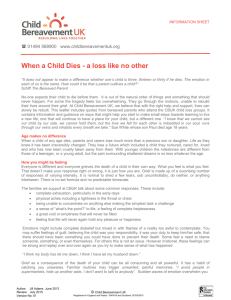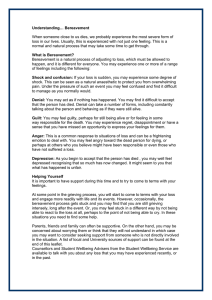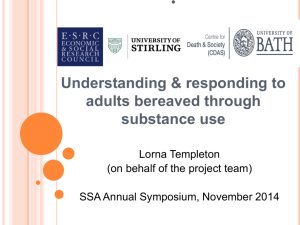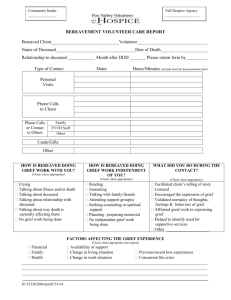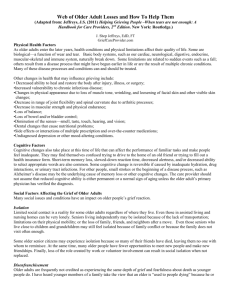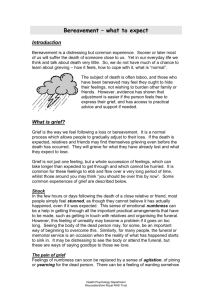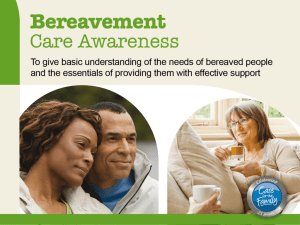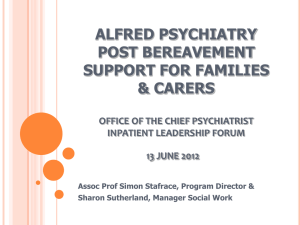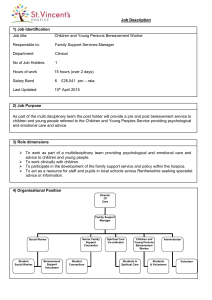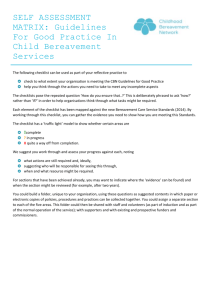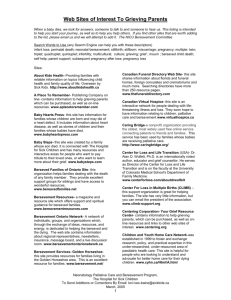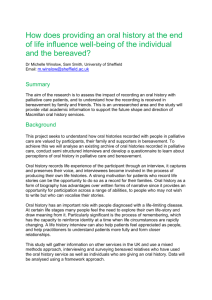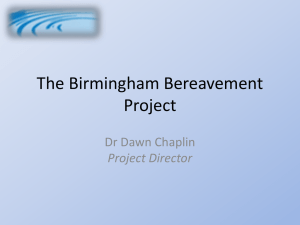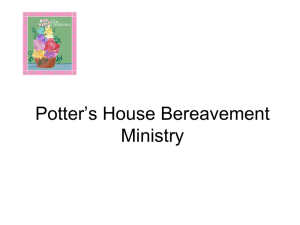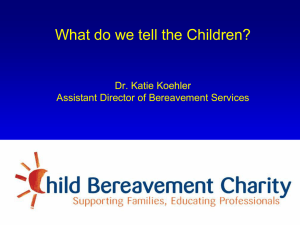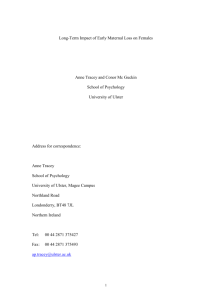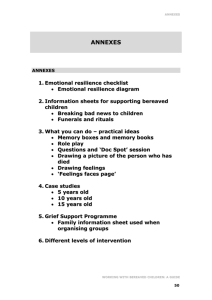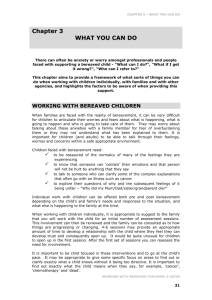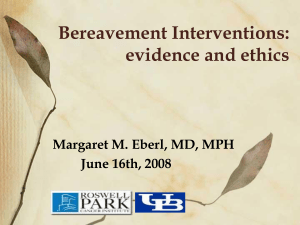Guidelines For Helping The Bereaved Returning to the Workplace
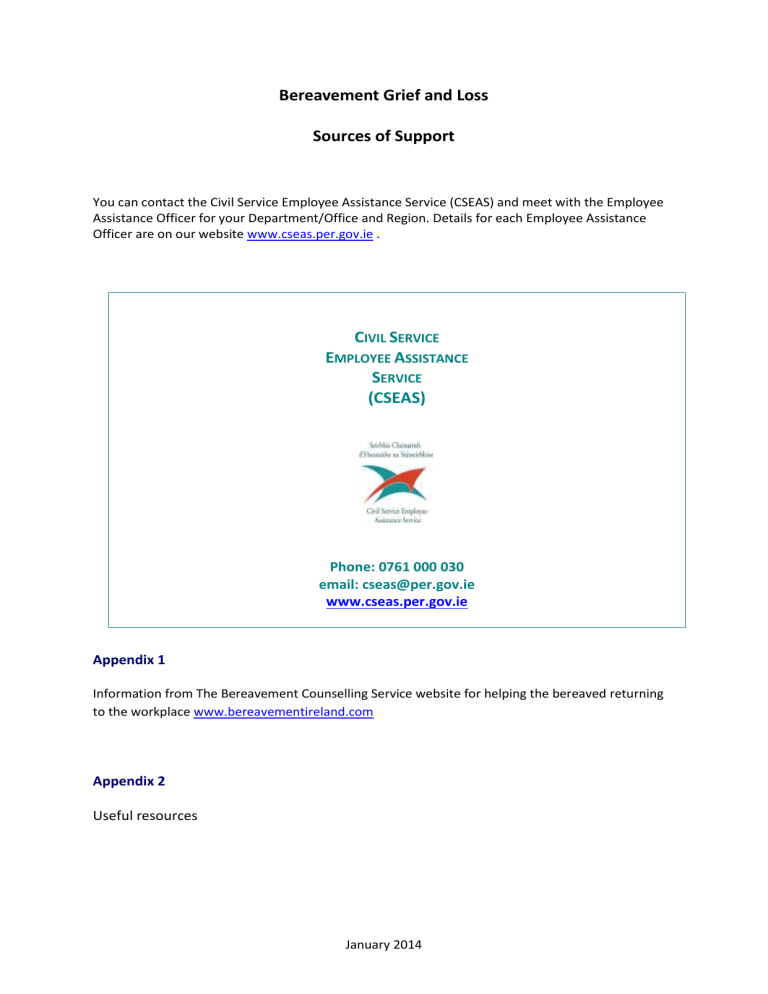
Bereavement Grief and Loss
Sources of Support
You can contact the Civil Service Employee Assistance Service (CSEAS) and meet with the Employee
Assistance Officer for your Department/Office and Region. Details for each Employee Assistance
Officer are on our website www.cseas.per.gov.ie
.
C IVIL S ERVICE
E
MPLOYEE
A
SSISTANCE
S ERVICE
(CSEAS)
Phone: 0761 000 030 email: cseas@per.gov.ie www.cseas.per.gov.ie
Appendix 1
Information from The Bereavement Counselling Service website for helping the bereaved returning to the workplace www.bereavementireland.com
Appendix 2
Useful resources
January 2014
Appendix 1 Information from the Bereavement Counselling Service
www.bereavementireland.com
Guidelines for Helping the Bereaved Returning to the Workplace
Acknowledge return to the workplace. Talk about the death and funeral.
Allow the bereaved person to talk. Repetition of details of the illness, death and funeral are common and perfectly normal. If they do not want to talk, say that you are there to support them.
Do not be upset by tears, repeated conversations, sudden outbursts of weeping or anger.
Allow time to adjust. Be aware that lowered self-esteem is a feature of bereavement and the bereaved can be helped to regain their confidence by continued reassurance.
Offer support and sympathy, but do not expect miracles! Grieving is normal, extremely painful and can take a long time to work through. Months and often years are necessary for the bereaved person to work through their grief, depending on the relationship to the deceased and the personal needs of the individual.
Do not worry about ‘what to say’ If in doubt say nothing, just be there. Do not use the phrase ‘if I were you’, it is not helpful.
Do not expect invitations to be accepted in the early stages, or imagine that social occasions are what is best for the bereaved person. Often these outings put pressure on the person to behave and conform to what is ‘normal’. Gentle inclusion should be made, but no offence or annoyance shown if these suggestions are rejected.
Try to remember how you would treat a colleague returning to work after major illness or surgery. Great consideration would be given to their physical ability to cope with work and social events. Bereavement can be akin to surgery of the emotions and needs equal patience and understanding in helping the bereaved person to come to terms with and cope with the loss.
Bereavement can often change lifestyles in many ways. Apart from the loss and pain caused by the death, domestic and financial situations can be altered considerably causing an added burden to the distress of the bereaved person.
January 2014
Widows or widowers returning to work usually have to re-organise their lives to a great extent and the pressure of domestic upheaval and work can combine to cause great distress. This distress is often expressed in outbursts of anger. Do not be surprised by these outbursts, quite often they are misplaced.
If your attempts to help are rebuffed, do not let it hinder you from trying again. It requires a lot of patience and courage to do this. Sometimes a kind act, an opportunity to allow the grieving person to talk, or maybe, depending on the circumstance, a little gift or token can do wonders for low self-esteem and shows real caring for the bereaved person. Praise for some difficult hurdle overcome by the bereaved person is often a great source of comfort.
The nature of the death plays a big part in grieving. Sudden death e.g. heart attack, road accident, violent death, suicide and murder can take a long time to be really accepted. In the case of a long illness some anticipatory grief may have been experienced, so the initial shock may not be so great. However the intensity of grief can only be measured in relation to each individual case.
January 2014
Appendix 2
Bereavement Issues Useful Resources
Where to find help?
Bereavement Counselling
Service
The Bereavement Counselling Service offers support and counselling to enable people deal with their grief.
Irish Hospice Foundation The Irish Hospice Foundation (IHF) is a national charity dedicated to all matters relating to dying, death and bereavement in Ireland. www.bereavementireland.com
www.hospice-foundation.ie
Console - for those bereaved by suicide
Miscarriage Association of
Ireland
National Organisation supporting people in Suicidal Crisis and those
Bereaved by Suicide through Professional Counselling, Support and
Helpline Services.
The Miscarriage Association of Ireland offers help and support those who experience miscarriage www.console.ie
www.miscarriage.ie
Barnardos Bereavement
Helpline
Barnardos Children’s Bereavement Service is a service for children and young people who have lost someone close to them – like a parent or a sibling - through death.
www.barnardos.ie
Helpline no 01 473 2110
Rainbows Ireland www.rainbowsireland.com
Rainbows Ireland is a peer-support programme to assist children and young people experiencing a significant loss in their lives through a death, separation or divorce in their family.
January 2014
